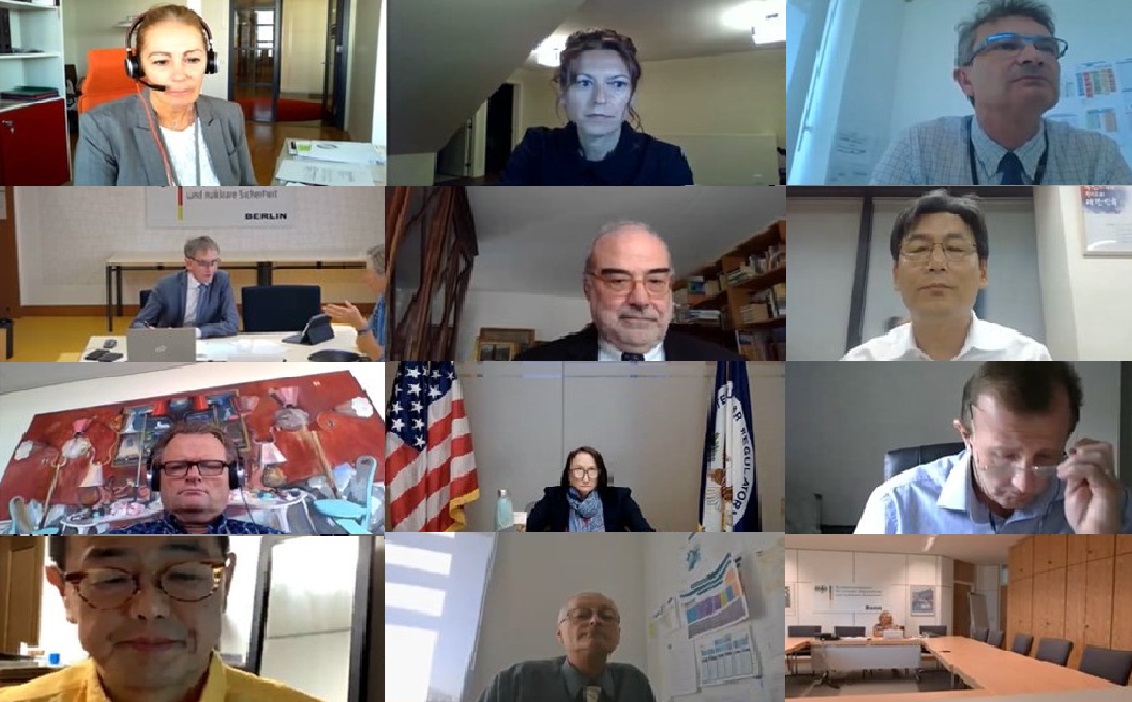Contenido principal
2020
CSN´s president outlines in INRA the main actions of the Spanish regulator during this year

The chairman of the CSN, Josep Maria Serena i Sender, participated this afternoon in the second annual meeting of the International Nuclear Regulators Association (INRA).
The meeting, held via videoconference, took place within the framework of the 64th General Conference of the International Atomic Energy Agency (IAEA), which is being held this week in Vienna, as its usual in the conduct of this body during the last decade.
Serena i Sender presented to his counterparts both the activities carried out by the CSN in recent months - in which everyone's work has been affected by the covid-19 pandemic - as well as the projects that, in the short term, the regulatory body will face.
In this sense, he highlighted, for example, that since the declaration of the state of alarm, 85% of the CSN staff has been teleworking, holding more than 2,600 videoconferences. And that, despite the adverse conditions of the pandemic, 81 reports related to radioactive facilities have been approved, another 19 related to nuclear facilities, 438 personnel licenses and course approvals or more than 400 consultations have been attended.
Likewise, the chairman of the CSN stated that last July the Commission approved a general criteria document so that some inspections can soon be carried out remotely, which represents a new way of developing the regulatory supervision and control activities.
In addition, Serena i Sender highlighted that the Spanish regulator is immersed in a digital transformation process in order to address the necessary improvements that teleworking has risen in recent months, even though the culmination of the digital transition in both regulatory processes of the CSN and in the management of its human and material resources, will require a detailed plan and extended in time.
Moreover, CSN´s chairman stressed out that given the teleworking situation that is being experienced, generated by covid-19, it is necessary to strengthen internal communication to maintain the cohesion of the working groups as well as to provide and offer the necessary tools for a better organization and leadership under these teleworking conditions.
Safety culture and public perception
Among the points dealt with at the meeting, the development of activities carried out by nuclear regulators in matters of, on the one hand, safety culture and, on the other, public perception, were addressed.
In this respect, Josep Maria Serena i Sender pointed out that the CSN has actively participated in international initiatives aimed at promoting and standardizing the culture of nuclear safety, such as in the framework of the Nuclear Energy Agency (NEA). In addition, he mentioned that the Commission of the CSN will entrust an external study on safety culture in the regulator in the near future.
Regarding the public perception of the regulator, the chairman of the CSN underlined that his organisation has always promoted public communication as one of its driving forces. In this sense, he advanced that a new study on the perception of the Nuclear Safety Council in Spanish society will be launched shortly thus giving, on the one hand, compliance with the request from the Advisory Committee for Public Information and Participation and, on the other, having available a magnificent tool to implement improvements in its management.
About INRA
INRA holds two meetings a year where regulatory issues of common interest are openly discussed. In this international association, transparency, multilateral cooperation and the exchange of experiences among the countries that compose it are promoted.
The International Nuclear Regulators Association (INRA), founded by the regulatory bodies of the nine countries in the world with more experience in the licensing of nuclear activities (Germany, Canada, Spain, France, Japan, United Kingdom, Republic of Korea, Sweden, and the United States of America) was created in Paris in May 1997.
*Check here the glossary of technical terms*
